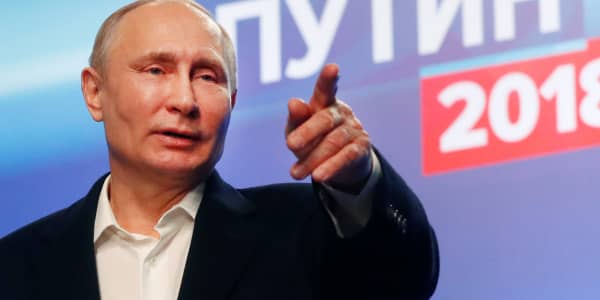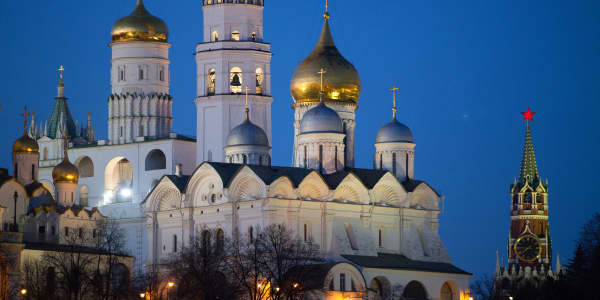He helped put Russia's economy back on track after the 1998 rouble crisis, and analysts say he's the "only man" that could disagree with President Vladimir Putin over the economy, making him possibly Russia's next prime minister. The only trouble is: Alexei Kudrin might not want the job.
The former minister of finance is widely tipped to replace Prime Minister Dmitry Medvedev, whose popularity has declined in public polls of late amid speculation of a growing rift with President Putin. Kudrin, on the other hand, is well known to economists and well-respected by the Russian public for his previous performance in government.
During his 11 years as the minister of finance from 2000 to 2011, Kudrin helped restore Russia's public finances which were damaged after the 1998 currency crisis, when the government devalued the rouble and defaulted on its debt.
Speaking to CNBC at the Saint Petersburg International Economic Forum (SPIEF), Kudrin said that he was "not the person hiring" in the government and, as such, running the economy was not up to him.
Asked whether he would return to serve the economy again since public and economic opinion was so positive about his abilities, Kudrin was evasive.
"Of course, I'm ready to do that but to do that effectively I need some power and empowerment," he remarked. "So far,I don't see that the proper conditions have been created for me to do that."
(Read More: Russia's Economy Could Be Next Big Underperformer)
Despite the sharp rise in oil prices over the past decade Kudrin managed to keep fiscal policy relatively conservative. This allowed for a build-up of Russia's oil funds which helped Russia withstand the global crisis in 2008 and 2009, Liza Ermolenko, emerging markets economist at Capital Economics, told CNBC.
"If this appointment does happen, it will signify a shift towards a more reform-orientated approach in policy making," Ermolenko said. "[He] has a very good reputation among international investors and analysts, so his return to the government will definitely be welcomed by the markets."
Russia is struggling with five consecutive quarters of slowing growth. In April, Russia's economic ministry cut the country's growth forecasts for 2013 from 3.6 percent to 2.4 percent.
Kudrin told CNBC that to reverse Russia's slowdown, the government needed to reform its business climate and dependency on natural resources for growth.
"I would like to see a comprehensive program to decrease Russia's energy and oil dependency," he said.
"Growth should come from other areas, for instance,transportations and communications but the government should also strive to make the rules transparent for investors to encourage investment."
He said that Russia's leaders had "not fully appreciated" the changes in Russia's economic landscape and that the "weight of this under-estimate" was weighing on the country's growth prospects. The system of governance as it stood was "not adequate for what we're facing."
"I talk extensively to foreign investors and institutions and they say that what they want to see is a fair set of rules [in the business environment] and transparent regulations."
(Read More: Russia's Leadership 'Could Hinge on Economy')
The country has been accused of making slow progress on structural reforms amid concerns over its over-reliance on a waning oil sector and signs of social unrest if the latest protests against Putin are anything to go by.
Furthermore, with relations between the president and prime minister - who was charged with reviving Russia's economy - seemingly frosty, there is further reason to believe that Medvedev could be replaced by Kudrin, who is currently the dean of the Faculty of Liberal Arts and Sciences at St. Petersburg State University.
The One Who Can Say 'No' to Putin
"The current prime minister is neither popular nor very effective and is increasingly described as hapless. Kudrin, on the other hand, is much respected in financial markets as well as in international policy circles more broadly for being a credible economic reformer," Marcus Svedberg, chief economist at independent asset manager East Capital, said.
Svedberg said that Kudrin was a "political heavyweight" who can stand up to the multitude of vested interests circulating in a resource economy like Russia. "And he is allegedly one of few, perhaps the only one, that can disagree with the president."
(Read More: Is Russia Too Corrupt for International Business?)
The most difficult job as finance minister, Svedberg added, is "having the ability to say 'no'."
"Kudrin [said 'no'] for over a decade and ultimately left when the prime minister did not listen. He should thus be well prepared for the job if offered to him, and it would be difficult to imagine a better prime minister for Russia at this particular point," Svedberg said.
Kudrin resigned as finance minister in September 2011 due to disagreements with Medvedev over increases in military spending.
He has however shown a reluctance to enter the fray of government life again. He has reportedly been offered a number of ministerial positions but has so far declined the offers. Economists said that was due to differences in opinions on economic policy.
"I suspect that for now at least it is still quite unlikely that Alexei Kudrin returns to the government," Ermolenko said. "Only last month Mr Kudrin stated that he disagrees with 'a whole range of decisions made by the government,' which signals that significant changes are required before he changes his mind."
Kudrin's very public disagreement could be a sticking point for a Russian regime that likes to portray a united front. But Svedberg said Kudrin had been very careful in his choice of words.
"Although Kudrin left the government after a public disagreement with Prime Minister Medvedev, and has continued to criticize the government, he has made sure not to criticize President Putin. This means he is 'employable' in this administration and has, according to rumors, already been offered several jobs. But he probably wants nothing below the premiership," Svedberg said.
- By CNBC's Holly Ellyatt, follow her on Twitter @HollyEllyatt





